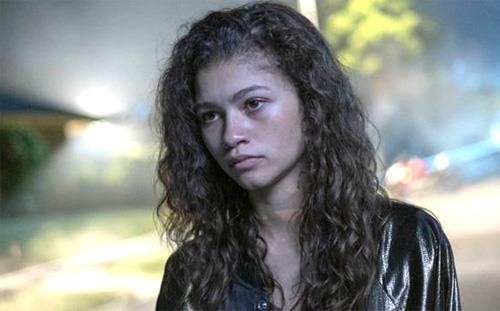
Way before Beverly Hills, 90210 or Gossip Girl, screwed-up teenagers were providing reliably fertile ground for television shows.
Euphoria,which premieres Sunday at 10 p.m. ET on HBO, takes the concept to a new level.
Euphoria focuses on Rue Bennett (Zendaya, top), a 17-year-old high school student who emerges from drug rehab matter of factly telling us viewers she will immediately begin using drugs again.
Rue is, in many ways, a sympathetic character. She’s acutely aware of all the bad things in the world around her, and because almost everyone who was ever a teenager knows those years have their rough stretches, we understand she’s just trying to find a way through.
For as long as she can remember, she says, she’s figured that you spend every day of your life “trying to outrun your anxieties.”
Rue is not, however, nodding off in an alley with a needle in her arm. She doesn’t go weeks without showering or lock herself in her room with her headphones listening to creepy music.
Nope, she’s out in the world, going to school, talking to her friends, arguing with her mother. She seems by outward appearances to be functioning in her teenage world – except it soon becomes clear this is in some measure because the traditional rules and parameters of that world have shifted.
Rue isn’t living in a 1950s sitcom, or a 1980s sitcom, or 90210. She’s living in a world where almost everyone around her seems to have plunged into drugs or sex or behavior that would have been considered aberrational and dangerous only a few years back.
In Euphoria, that behavior isn’t quite the universal norm. There are still old-school “good kids.” But the population in Rue’s part of the world seems to have expended exponentially, and it feels like almost a hopeless battle for people like Rue’s mother Leslie (Nika King) who struggle to reset it.
What does harken back to TV high schools of the past is the cruel social hierarchy – the mean girls, the jocks who take their stature as a license to bully, the nerds who are their victims.
To the extent Rue is an outlier, it’s largely because she scorns classmates like Nathan (Jacob Elordi), the star athlete who hides his insecurities behind a sneering swagger.
Nate is, naturally, dating the hottest girl in the class, Maddy (Alexa Demie), except she’s got a nasty streak of her own so their relationship is volatile. After one of their breakups they end up at the same large party and Maddy impulsively executes a public vengeance move that in the olden days would have gotten Euphoria relegated to showings at “art houses.”
Here, that same move is only mildly surprising to her classmates and maybe not terribly shocking to the viewing audience, since it’s the direction in which television has been taking teen behavior for years.
As the Nate-and-Maddy drama suggests, Euphoria, in many ways, frames the world around Rue as a graphic soap opera, one part familiar interpersonal dramas and one part extreme behavior with a wide range of consequences.
There is, for instance, transgender Jules (Hunter Schafer), the new kid in town, who befriends Rue because she’s an outcast herself. Jules exhibits a fascinating combination of neuroses, adding up to what might be called a vulnerable survivor.
Jules is both self-destructive and resilient in ways that parallel Rue’s own complex combination of behaviors.
Euphoria serves up at least another dozen characters, including Rue’s younger and straighter sister Gia (Storm Reid) and various classmates. Then there’s Rue’s drug dealer, whose vocabulary and sales skills won’t strike everyone as age-appropriate.
In the wider picture, the more significant subtext of every teen drama since TV discovered teenagers concerns the immediacy of navigating those years. Whether the drama revolves around a prom dress or the advisability of arranging hookups on the Internet, the point is that to the teenagers involved, that drama matters right now and matters a lot.
It’s part of shaping your life, the way you look at yourself, the way others look at you, the decisions you make and what they say about how you look at the world.
Viewers may look at Rue and question what her life will look like in 10 years, or 30 years. For Rue, that matters less than the moment. So if the potential answers aren’t as terrifying to her as they might be to older viewers, welcome to one show’s vision of today’s teenage world.